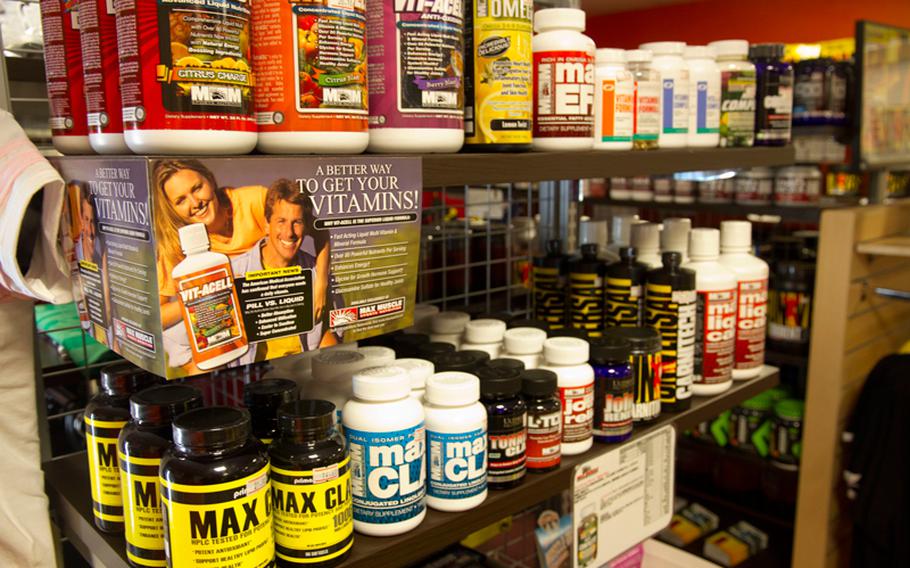
Dietary supplements, such as these for sale in the Yokota Air Base gym, are popular with servicemembers, but a recent study found that many users don't fully understand the safety and effectiveness of what they're taking. (Wyatt Olson/Stars and Stripes)
Soldiers know rifles, tanks and first aid. Dietary supplements are another matter.
Fewer than half of Army troops understand the U.S. government doesn't require manufacturers to demonstrate the effectiveness of supplements commonly used for bodybuilding, weight loss, energy and endurance, according to a recent study from the U.S. Army Research Institute of Environmental Medicine in Natick, Mass.
A third incorrectly believed the Food and Drug Administration, which oversees regulation of pharmaceuticals, enforces pre-market safety requirements for supplements.
"Fundamentally, the FDA only gets involved when it starts to get notices that people are having adverse events from a particular product," said Dr. Harris Lieberman, a research psychologist at the Natick institute and co-author of the study.
What's in - or not in - supplements has been of particular concern to the Department of Defense since two soldiers died in separate incidents last year and investigators found the stimulant dimethylamylamine, or DMAA, in their systems. The DoD banned the sale of products with DMAA in all base outlets and is investigating a possible link with the deaths.
About 53 percent of active military personnel use supplements, a slightly higher rate than for civilians, the study said. Usage rates in the military rise significantly with rank, education and association with "elite" outfits such as Special Operations.
Partly in response to last year's deaths, the Pentagon has launched Operation Supplement Safety, a campaign aimed at increasing servicemembers' knowledge of supplements.
That includes military doctors.
Sixty percent of military physicians have observed "adverse events" in servicemembers using dietary supplements, according to a recent study by researchers at the Uniformed Services University of the Health Sciences in Bethesda, Md. An adverse event is an "undesirable experience" with a product or therapy, according to the FDA.However, only 18 percent of the doctors reported those adverse events.
Why? Because three-quarters of physicians didn't know how or where to report them, the study found. Most said they didn't have a reliable source of information regarding herbal and dietary supplement products.
"The real emphasis of Operation Supplement Safety is to build awareness among the warfighters, but also among the medical community," said Dr. Patricia Deuster, director of the Human Performance Resource Center and a professor at USU.
"The medical community is almost as ignorant as the general population because they don't get the education in medical schools, for the most part, as to the regulation of dietary supplements and how you can choose a supplement safely."
The safety campaign offers free access to the Natural Medicines Comprehensive Database at for anyone with a .mil email address. Access through an app named WarriorSupp is expected to be available in a few weeks, Deuster said.
The database is searchable with more than 86,000 entries, which include origins and explanations of supplements, existing evidence of effectiveness and known harmful interactions with other supplements, pharmaceuticals and foods.
For example, the entry for cowhage, a bean-like plant from the tropics used to treat Parkinson's disease, anxiety, arthritis and other conditions, explains there is insufficient evidence to rate its effectiveness. However, "developing research" suggests it might help improve symptoms of Parkinson's when used with other prescription drugs.
The entry red-flags several bad interactions with prescription drugs, including a handful of anti-depressants, the combination of which can cause high blood pressure, seizures and nervousness.
Deuster said adverse events involving supplements are frequent but often go unreported, as the study of military doctors found.
"There's a lot of supplements out there that have been contaminated, intentionally adulterated, unintentionally adulterated," she said. "The supplement industry, a certain segment - not the entire industry by any stretch of the imagination - can put multiple, 50,100 ingredients in. They sell it to the warfighter, who wants to be the best warrior he can be or needs to lose weight."
One of the few regulations for supplements coming on the U.S. market is that they contain only natural ingredients, Deuster said.
That's one of the problems with the DMAA found in many supplements on the market, which many makers claim is derived from geraniums.
"The scientific evidence suggests that in fact DMAA is not a natural ingredient found in any particular plant or animal," Lieberman said.
Deuster said that last year's soldier deaths linked to DMAA pushed the subject of dietary supplements to the "highest levels" of the defense department. She said she's involved in the department's investigation into the matter and expects it to be completed before the end of the year.
Lieberman has studied numerous aspects of supplements, including the caffeine many contain. For servicemembers, he offers straight-forward advice when considering the use of supplements.
"My personal opinion is, if you don't know for sure that it works and there's not scientific agreement that it's going to help you, there's probably no reason to take it," he said.
"Unless you have knowledge about a supplement that's scientifically based, you can't make a determination; you can't count on the government for providing you with that information. Just because the supplement is sold doesn't prove that it's been shown to work or demonstrate for sure that it's safe.
"You're on your own."